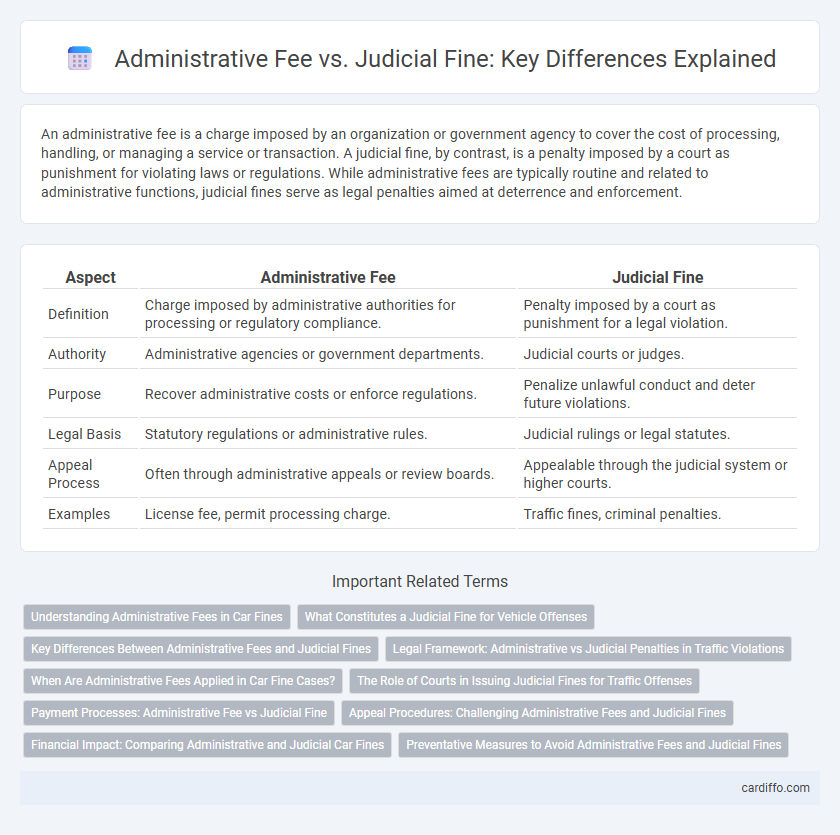An administrative fee is a charge imposed by an organization or government agency to cover the cost of processing, handling, or managing a service or transaction. A judicial fine, by contrast, is a penalty imposed by a court as punishment for violating laws or regulations. While administrative fees are typically routine and related to administrative functions, judicial fines serve as legal penalties aimed at deterrence and enforcement.
Table of Comparison
| Aspect | Administrative Fee | Judicial Fine |
|---|---|---|
| Definition | Charge imposed by administrative authorities for processing or regulatory compliance. | Penalty imposed by a court as punishment for a legal violation. |
| Authority | Administrative agencies or government departments. | Judicial courts or judges. |
| Purpose | Recover administrative costs or enforce regulations. | Penalize unlawful conduct and deter future violations. |
| Legal Basis | Statutory regulations or administrative rules. | Judicial rulings or legal statutes. |
| Appeal Process | Often through administrative appeals or review boards. | Appealable through the judicial system or higher courts. |
| Examples | License fee, permit processing charge. | Traffic fines, criminal penalties. |
Understanding Administrative Fees in Car Fines
Administrative fees in car fines typically cover the cost of processing and managing traffic violations, including paperwork, notifications, and enforcement activities. These fees differ from judicial fines, which are monetary penalties imposed by a court as punishment for the violation itself. Understanding the role of administrative fees helps drivers recognize that they finance operational expenses rather than punitive measures in the traffic enforcement system.
What Constitutes a Judicial Fine for Vehicle Offenses
A judicial fine for vehicle offenses constitutes a monetary penalty imposed by a court following a legal judgment related to traffic violations, such as speeding, reckless driving, or driving without a license. This fine is part of the judicial process and may be accompanied by other penalties like license suspension or mandatory court appearances. Unlike administrative fees, judicial fines result from formal court decisions and have legal enforcement that can include liens or imprisonment for non-payment.
Key Differences Between Administrative Fees and Judicial Fines
Administrative fees are charges imposed by government agencies to cover the cost of processing permits, licenses, or other services, often fixed and predictable in amount. Judicial fines are penalties ordered by courts as punishment for legal violations, typically varying based on the severity of the offense and judicial discretion. Unlike administrative fees, judicial fines carry legal consequences and aim to deter unlawful behavior rather than simply recoup administrative costs.
Legal Framework: Administrative vs Judicial Penalties in Traffic Violations
Administrative fees in traffic violations are imposed under administrative regulations, allowing authorities to handle cases swiftly without court involvement, while judicial fines are penalties determined through legal proceedings in a court of law. The legal framework distinguishes administrative penalties as preventive measures, applicable for minor infractions, whereas judicial fines are punitive sanctions issued after due process for more severe or contested violations. Understanding this differentiation clarifies enforcement mechanisms and rights of the accused under traffic law jurisdiction.
When Are Administrative Fees Applied in Car Fine Cases?
Administrative fees in car fine cases are applied when processing penalties related to traffic violations, such as late payments or administrative handling of tickets. These fees cover the costs incurred by governmental agencies for managing fines and maintaining records, distinct from judicial fines imposed by courts following legal proceedings. Understanding the distinction helps drivers anticipate additional costs beyond the base fine when dealing with traffic infractions.
The Role of Courts in Issuing Judicial Fines for Traffic Offenses
Judicial fines for traffic offenses are imposed by courts as a legal penalty following due process, ensuring fairness and adherence to traffic laws. Administrative fees, by contrast, are typically imposed by governmental agencies without judicial intervention and often cover procedural costs rather than punish offenses. The role of courts is crucial in assessing the severity of violations, considering evidence, and determining appropriate judicial fines to uphold justice and traffic safety.
Payment Processes: Administrative Fee vs Judicial Fine
Payment processes for administrative fees typically involve a straightforward procedure conducted through designated government offices or online portals, often requiring immediate or scheduled payment without formal court involvement. Judicial fines, on the other hand, are imposed through court orders following legal proceedings and may include additional steps such as hearings, appeals, and payment plans supervised by the judicial system. Both payment types require adherence to specific deadlines and documentation, but judicial fines usually demand stricter compliance due to their legal implications and potential enforcement actions.
Appeal Procedures: Challenging Administrative Fees and Judicial Fines
Appealing administrative fees involves submitting a formal request to the relevant agency within a specified timeframe, often requiring evidence of procedural errors or unjust assessment. Judicial fines, imposed by courts, demand filing an appeal with a higher court that reviews the legality and proportionality of the fine based on case facts and law. Strict adherence to appeal deadlines and procedural rules is critical for successful challenges against both administrative fees and judicial fines.
Financial Impact: Comparing Administrative and Judicial Car Fines
Administrative car fines typically impose lower financial penalties and offer faster resolution compared to judicial fines, which often involve higher costs due to court fees and potential legal representation. Judicial fines can significantly increase the total financial burden, especially when compounded by additional sanctions such as license suspension or vehicle impoundment. Understanding this cost disparity helps drivers make informed decisions about contesting or accepting fines to minimize their financial impact.
Preventative Measures to Avoid Administrative Fees and Judicial Fines
Implementing thorough compliance audits and employee training programs significantly reduces the risk of incurring administrative fees and judicial fines. Regularly updating company policies to align with legal regulations ensures adherence to statutory requirements and minimizes violations. Leveraging automated monitoring systems helps detect potential infractions early, fostering proactive corrective actions and avoiding costly penalties.
Administrative fee vs Judicial fine Infographic

 cardiffo.com
cardiffo.com